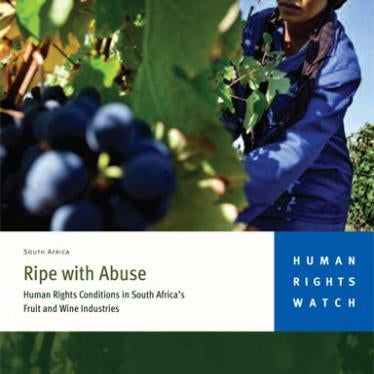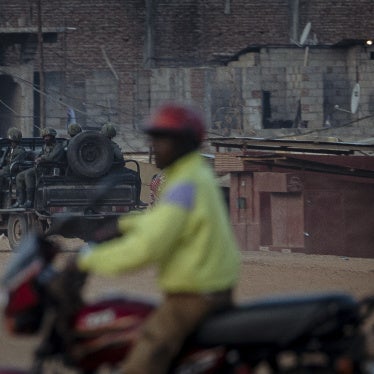The recent strikes by farm workers in Western Cape should be a wake-up call for the government and business on the poor labour conditions in the agricultural sector. Over the past few weeks, farm workers have downed tools, blocked the N1 highway, set vineyards alight and demanded an increase in their wages from R70 to a R150 a day. The strike, which started in De Doorns spread to other towns, caught many by surprise, but it shouldn’t have.
Our extensive research into working conditions in the fruit and wine industries, culminating in a 111-page report entitled “Ripe with Abuse” in 2011, highlighted general and widespread lack of compliance with labour legislation such as the Occupational Health and Safety Act and the Sectoral Determination for Farm Workers. We interviewed more than 260 farm workers, farm owners, civil society members, academics, union and government officials and industry representatives.
We found that farm workers earn among the lowest wages in South Africa and often endure deplorable working and living conditions. Many workers have limited access to essential services and adequate housing on farms, and weak land tenure security, making them vulnerable to evictions or displacement.
Although the research revealed that some farms comply with relevant labour and health legislation, it also exposed some of the worst human rights abuses. On one farm, we found a family living in a former pig stall. They had been living under those horrid conditions for 10 years without water, sanitation or electricity. On another farm, we found that the dop system – paying farm workers in alcohol – still existed.
This is not to suggest that policy changes have not taken place in agriculture. On the contrary, the inclusion of farm workers in the Labour Relations Act of 1995, and legislation such as the Sectoral Determination for Farm Workers, Extension of Security of Tenure Act of 1997 and Labour Tenants Act of 1996 are all laudable, creating equity and protecting the interests of both farm workers and farmers. The problem, however, is that many, if not all, of the policies resulting from this legislation have been difficult to implement and enforce. The lack of enforcement and poor monitoring by the government has meant that despite these legal protections on paper, there is on-going exploitation and abuse.
Labour relations between farmers and farm workers have always been especially inequitable. Historically, the class of black and coloured farm workers in South Africa was deliberately created by the segregationist and apartheid regimes as a marginalised and exploitable labour force. As a result of being historically excluded from the formal labour relations machinery until the 1990’s, farmers were able to develop their own labour relations system based on their self-interest, giving the farmer extensive control over virtually every aspect of the farm worker’s life.
Although the negotiations for wage increases facilitated by the Commission for Conciliation, Mediation and Arbitration may solve some of the immediate problems, they will not resolve the need for comprehensive progress in labour rights in the agricultural sector.
Our research revealed that despite the Sectoral Determination for Farm Workers, which specifies housing standards, housing for agricultural workers is generally substandard and unsafe, lacks adequate sanitation and fails to provide protection from the elements. Farm dwellers continue to face illegal evictions or are harassed and threatened until they leave and police often don’t know that summary evictions constitute an offence.
In many cases, we found a general lack of compliance with health and safety legislation with the result that farm workers did not have appropriate equipment for dealing with pesticides and other harmful substances.
If the South African government is serious about transforming the countryside it should find ways to urgently put into practice the existing labour protections for farm workers. The government should also consider establishing a Farming Community Forum under the auspices of the President’s Office.
This forum would be a place where farm dwellers, farm owners, organizations representing the interests of farm workers, and the government could interact to holistically address the many issues facing people in farming communities. Among other points, this forum needs to urgently review the minimum wage and create strong rights to tenure security so that farm workers are able to live a life of dignity and freedom.
..
Cameron Jacobs is South Africa director at Human Rights Watch. “Ripe with Abuse: Human Rights Conditions in South Africa’s Fruit and Wine Industries,” was published in August 2011.







